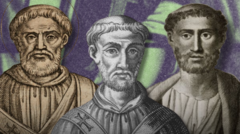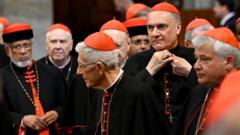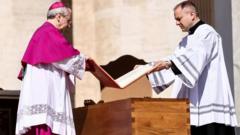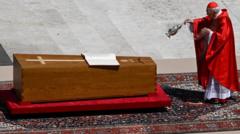This article delves into the significant impact of three ancient African popes—Victor I, Miltiades, and Gelasius I—on Christian traditions and their enduring legacies in a predominantly Muslim North Africa today.
The Legacy of North African Popes in Christianity and Their Cultural Impact

The Legacy of North African Popes in Christianity and Their Cultural Impact
Explore how historical African popes shaped Christianity, including the establishment of Easter and Valentine's Day celebrations.
The legacy of North Africa as a vital part of early Christianity is often overlooked, despite its historical significance that shaped religious practices still celebrated worldwide. Once a stronghold of Christian belief, the region now predominantly practices Islam, yet its past claims a remarkable influence through three popes of African descent: Victor I, Miltiades, and Gelasius I.
Victor I, who served from 189 to 199 AD, is often heralded for his firm opposition to practices conflicting with early Christian beliefs, particularly regarding the celebration of Easter. He led the first Roman Synod, emphasizing that the resurrection of Christ should be celebrated on a Sunday, contrasting with certain Eastern Christian groups that followed Jewish calendrical traditions. This “Easter controversy” reflected broader conflicts between East and West in early Christianity, and Victor I's decisive leadership played a crucial role in resolving these debates, marking a shift in ecclesiastical authority. Furthermore, he advocated for Latin to replace Greek in church liturgy, standardizing the language of worship for generations.
Miltiades, who reigned from 311 to 314 AD, oversaw a transformative period in Christian history as the faith gained acceptance within the Roman Empire. The first pope to receive a palace from Emperor Constantine, Miltiades was instrumental in establishing the Lateran Basilica, now regarded as the "mother of all churches." However, scholars recognize that he capitalized on the changing status of Christianity rather than being a direct catalyst for these transformations.
The influence of Gelasius I (492-496 AD) is particularly noteworthy, as he became recognized for formalizing the title "Vicar of Christ." He articulated the Doctrine of the Two Swords, clarifying the relationship between church authority and state power, asserting that both derive from divine will yet operate independently. Gelasius is also remembered for instituting St. Valentine’s Day on February 14, 496 AD, to commemorate the martyrdom of St. Valentine, effectively merging Christian observance with existing cultural traditions.
Despite their significant contributions to Christianity, no popes of African ancestry have ascended since Gelasius I, leading many to ponder the reasons behind this absence. The strength of Islam in North Africa and socio-political transformations are often cited. Still, others argue that the election processes of the papacy have largely excluded African candidates, despite the increasing Catholic population in sub-Saharan Africa, which is currently growing at an unprecedented rate.
There remain hopeful prospects, as three African cardinals are presently considered strong contenders to succeed Pope Francis. As worldwide Catholic demographics shift, some experts argue the time may soon come when the papacy could welcome its first African pope in over a millennium. The legacy of the early African popes continues to resonate, and their historical significance may influence the future landscape of Christianity.




















